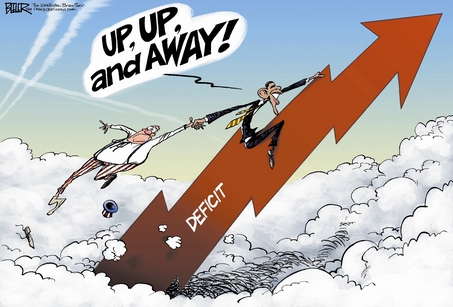
Cartoon on U.S. budget deficit from Washington Examiner. Source: www.pennlive.com/…/2009/03/bobby_jindal.html
It wasn’t Paul Kennedy who first said that great powers who over-extend themselves — either externally or internally — fast-forward the date of their decline, but he wrote about imperial over-extension and decline so convincingly in a best-selling book in the late 80’s. Political Scientist Robert Gilpin in War and Change in World Politics argued that both internal and external over-extension overburdens a hegemonic power such as the U.S. and results in an early decline.
A colleague on the Global Markets blog and other FPA bloggers have applauded President Obama’s economic policies for rescuing America and the world from an early demise. The stimulus package was the right thing to do at the right time, I agree, as was the bank rescue, which began under Bush’s watch, spearheaded by Republicans Paulson and Bernanke as well as Democrat Geithner, a year ago, lest we forget. I wrote about that on my blog, applauding all those involved on both sides of the aisle. Yes, Paulson was helped along by Democrats Pelosi and Reid and brave Republican Mitch McConnell, whereas the rest of the Republican caucus abdicated all responsibility in the name of free market capitalism. Like Lenin said, the last capitalist will sell the rope to hang the second-to-last capitalist. I did hear, nonetheless, from not a few Democrats at that time who opposed the bank bailout, including some so-called New Democrats.
In any case, I applaud President Obama’s continuation of Paulson’s policies (and remember, these were policies backed wholeheartedly by the much-maligned George W. Bush).
But why health care reform? Okay, I know why health care reform. But why now? Why now, with U.S. General Government Debt set to reach nearly 100% of GDP within two years??!!
The answer: because Dems have majorities in Congress and they’re afraid they’ll miss this opportunity to extend entitlements. The prudent thing to do — the thing leaders of a great power wishing to prolong its great power status would do — is: tackle health care reform when (and if) the ship of state is not in hock.
An Economist article points out the fine job accomplished last night by the Great Communicator (II). It also points out that President Obama put a figure on the cost last night — $900 billion, or 5-10% of GDP. Obama in his speech committed to convening an independent panel of experts to find savings in Medicare and other health schemes and to putting in mandatory cuts if cost restraint doesn’t materialize. Hats off to the president for including these two commitments in this expansion of the role of the state. Nevertheless, to those of us worried about the decline of a great power so important to the liberal institutions of the world, this health care reform remains an awful lot of the farm to bet on the Great Communicator’s promises before a joint session of a Democratic Congress.